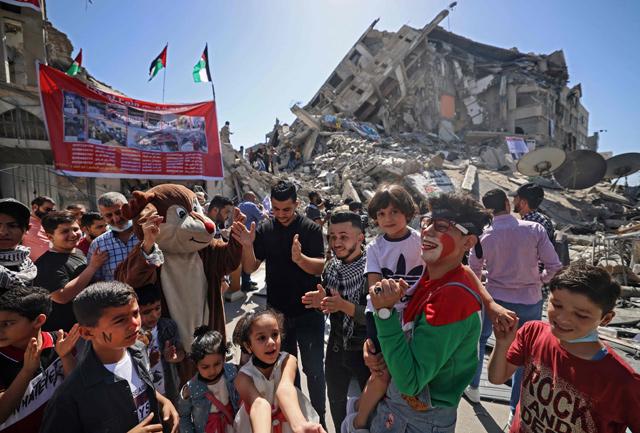- International News
- Web-2021-05-26 | 01:56 pm

The latest escalation in the Middle East conflict served to unite the geographically fragmented Palestinian community in a way not seen in years, analysts say.
From the blockaded Gaza Strip to the occupied West Bank and occupied East Jerusalem to Arab-Israelis living inside Israel, scattered people pulled closer together.
A sea of Palestinian flags flew in solidarity rallies, especially during "Day of Rage” protests and a general strike on May 18 that cut across separate areas.
Administrative offices, schools and businesses closed across the West Bank to protest the bombardment of Gaza but also against expanding Jewish settlements in the occupied territories.
In a rare move, the shutters also came down in East Jerusalem, the part of the Holy City annexed by Israel, and in Arab-Israeli population centres such as Nazareth and Acre.
"To see every single Palestinian community rise up together, this is extremely rare,” said Salem Barahmeh, director of the Palestine Institute for Public Diplomacy.
"To go on a national strike and protest and to have the Palestinian diaspora also involved, that’s pretty historic,” he said, referring to rallies by Palestinians abroad.
Scattered communities
Palestinians have long demanded their own state, with East Jerusalem as its capital, but for now the community is fragmented, with each part facing a different reality.
In the latest confrontation, Israeli bombs rained down on Gaza, the blockaded coastal enclave of 2 million ruled by Islamist group Hamas, who had fired rockets at Israel.
The escalation was sparked by clashes between Israeli police and Palestinians at East Jerusalem’s Al Aqsa Mosque compound, one of Islam’s holiest sites that is also sacred to Jews.
The ensuing violence also spread to the West Bank, where Israeli forces are largely in charge but the Palestinian Authority led by the secular Fateh movement has limited control.
More than 25 Palestinians were killed in West Bank clashes.
Inter-communal violence also flared in Israeli areas where Jews and Arabs usually live side by side.
An Arab-Israeli, Mussa Hassuna, was killed in a confrontation between Jewish nationalists and young Arabs in Lod, in central Israel.
Israeli Arabs are the descendants of Palestinians who stayed on their land after the creation of Israel in 1948.
‘Fight for legitimacy’
The fragmentation has long served to "ensure that there is no full Palestinian engagement geographically, socially and politically”, said Barahmeh, who is based in Ramallah in the West Bank.
"While Gaza is mired in poverty, the West Bank after successive intifadas [uprisings] has seen liberal economic policies and the emergence of a middle class that at times seems less politically engaged,” he said.
Gaza’s rulers Hamas, unlike Fatah, do not recognise Israel and the group is considered a "terrorist” organisation by the US and EU.
Arab-Israelis, a minority of about 20 per cent in Israel, meanwhile face their own unique challenges, said Amal Jamal, political science professor at Tel Aviv University.
"Palestinians in Israel are realistic, they have been living with Jews for decades, they understand the Israeli psyche, politics, culture, they speak Hebrew fluently,” he said.
"Palestinians in Israel are fighting for their legitimacy, to be part of the political system, part of the decision making, in order to lead to a solution to the Palestinian problem.”
Mariam Barghouti, a researcher and Palestinian activist, said that in the wider community "each person has a different experience with the Israeli state and that creates isolation for different communities.”
"It breaks the ability to relate to each other and our experiences.”
‘Start of something’
But amid the recent surge in violence, Barghouti said, Arab-Israelis found themselves confronted by "people shouting ‘death to Arabs’ and attacking Palestinians with weapons”.
They realised that "it’s not just a West Bank problem, not just a Gaza problem”, said Barghouti. "It is an apartheid problem, a colonial problem, it’s an Israeli state problem.”
The US-based group Human Rights Watch and Israel’s B’Tselem recently accused Israel of running an "apartheid” system — a charge strongly rejected by Israel.
Jamal also said that the recent flare-up "made everybody feel how Palestinian they are. But there is a big difference between the sentiment and the political will or political orientation”.
Palestinians have been politically divided between Hamas and its rival Fateh, which has seen splinter groups emerge.
Palestinian President Mahmud Abbas of Fateh had recently called the first Palestinian elections in 15 years this year.
But he then indefinitely postponed the polls, blaming voting restrictions in East Jerusalem, which led Hamas to accuse Abbas of perpetrating a "coup”.
Despite those divisions, a sense of common Palestinian identity has been strengthened, said Barahmeh.
"You see people coming out together in a unified manner, speaking the same language... protesting the same system, projecting the same identity,” he said.
"Everything we see tells us that there is a form of unity. Is it fully formed? No... But I think it’s the start of something.”













